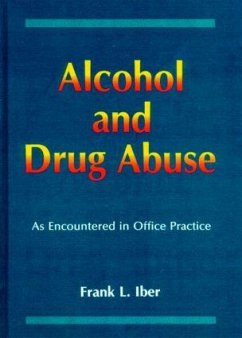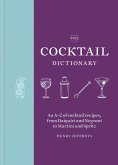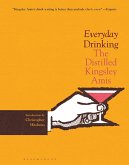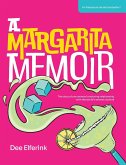Frank L. Iber
Alcohol and Drug Abuse as Encountered in Office Practice
Frank L. Iber
Alcohol and Drug Abuse as Encountered in Office Practice
- Gebundenes Buch
- Merkliste
- Auf die Merkliste
- Bewerten Bewerten
- Teilen
- Produkt teilen
- Produkterinnerung
- Produkterinnerung
This book has been written to serve as a manual for physicians practicing in a private office setting to recognize and recommend appropriate treatment for patients believed to be substance abusers
Andere Kunden interessierten sich auch für
![Wine Girl Wine Girl]() Victoria JamesWine Girl24,99 €
Victoria JamesWine Girl24,99 €![Wild Cocktails Deck Wild Cocktails Deck]() Lottie MuirWild Cocktails Deck17,99 €
Lottie MuirWild Cocktails Deck17,99 €![The Story Book Drink Book The Story Book Drink Book]() Dewey HenryThe Story Book Drink Book22,99 €
Dewey HenryThe Story Book Drink Book22,99 €![The Art of Mixing The Art of Mixing]() James A. WileyThe Art of Mixing12,99 €
James A. WileyThe Art of Mixing12,99 €![The Cocktail Dictionary The Cocktail Dictionary]() Henry JeffreysThe Cocktail Dictionary18,99 €
Henry JeffreysThe Cocktail Dictionary18,99 €![Everyday Drinking Everyday Drinking]() Kingsley AmisEveryday Drinking24,99 €
Kingsley AmisEveryday Drinking24,99 €![A Margarita Memoir A Margarita Memoir]() Dee ElferinkA Margarita Memoir39,99 €
Dee ElferinkA Margarita Memoir39,99 €-
-
-
This book has been written to serve as a manual for physicians practicing in a private office setting to recognize and recommend appropriate treatment for patients believed to be substance abusers
Hinweis: Dieser Artikel kann nur an eine deutsche Lieferadresse ausgeliefert werden.
Hinweis: Dieser Artikel kann nur an eine deutsche Lieferadresse ausgeliefert werden.
Produktdetails
- Produktdetails
- Verlag: CRC Press
- Seitenzahl: 338
- Erscheinungstermin: 26. November 1990
- Englisch
- Abmessung: 260mm x 183mm x 23mm
- Gewicht: 832g
- ISBN-13: 9780849301667
- ISBN-10: 0849301661
- Artikelnr.: 22290589
- Herstellerkennzeichnung
- Libri GmbH
- Europaallee 1
- 36244 Bad Hersfeld
- gpsr@libri.de
- Verlag: CRC Press
- Seitenzahl: 338
- Erscheinungstermin: 26. November 1990
- Englisch
- Abmessung: 260mm x 183mm x 23mm
- Gewicht: 832g
- ISBN-13: 9780849301667
- ISBN-10: 0849301661
- Artikelnr.: 22290589
- Herstellerkennzeichnung
- Libri GmbH
- Europaallee 1
- 36244 Bad Hersfeld
- gpsr@libri.de
Frank L. Iber
BACKGROUND. Introduction to Abused Substances. Terminology, Definitions,
FDA Classifications, DSM III R Diagnostic Criteria. Molecular Basis of
Action of Abused Substances. Etiology of Substance Abuse; Similarities of
Alcohol and Drug Abuse. Essential Pharmacology of Abused Drugs. Issues of
Law and Custom. Attitudes Among Medical Staff Influencing Substance Abuse
Care. SKILLS. Obtaining an Accurate Drug and Alcohol History. Recognition
of the Alcoholic and Substance-Abusing Patient in Your Practice.
Emergencies in Drug and Alcohol Use and Their Management. Laboratory Use in
Screening and Verification of Drug Use. Cost-Effective Screening of
Addicted Persons for Significant Illness. Classes of Drugs Needed for the
Successful Management of Addiction. Informing the Patient of the Diagnosis
of Abuse and Motivating Him to Treatment. SUBSTANCES AND THEIR SPECIFIC
PROBLEMS. What Can Be Learned from Smoking and Nicotine Addiction. Alcohol
and Sedatives. Medical Problems in Alcoholics. Psychiatric Problems in
Addicts. Opium Derivatives. Medical Problems Related to illicit Drugs.
Cocaine and Amphetamines. Marijuana. Hallucinogens and Phencyclidine.
Miscellaneous Abused Drugs. Mixed Drug Abuse. TREATMENT AND REHABILITATION.
What Is Treatment and What Does It Accomplish? Drug Withdrawal: Recognition
and Treatment. Entering Treatment. Professionals and Others Providing
Skilled Services to Substance Abusers. The Range of Treatment and
Rehabilitation Programs: Factors in the Selection of an Appropriate
Program. Setting and Meeting Realistic Goals for Rehabilitation. Volunteer
Groups in the Treatment of Addictions: The Model of Alcoholics Anonymous.
Crises in Treatment. Prevention and Pertinent Public Health Issues. SPECIAL
GROUPS. Special Problems of Substance Abuse in Adolescence. Special
Problems in Women Abusers. Problems of Addiction During Pregnancy and
Problems in the Child. Children of Alcoholics and Drug Abusers. Alcoholism
and Addictions in the Elderly. Addictions in Ethn
FDA Classifications, DSM III R Diagnostic Criteria. Molecular Basis of
Action of Abused Substances. Etiology of Substance Abuse; Similarities of
Alcohol and Drug Abuse. Essential Pharmacology of Abused Drugs. Issues of
Law and Custom. Attitudes Among Medical Staff Influencing Substance Abuse
Care. SKILLS. Obtaining an Accurate Drug and Alcohol History. Recognition
of the Alcoholic and Substance-Abusing Patient in Your Practice.
Emergencies in Drug and Alcohol Use and Their Management. Laboratory Use in
Screening and Verification of Drug Use. Cost-Effective Screening of
Addicted Persons for Significant Illness. Classes of Drugs Needed for the
Successful Management of Addiction. Informing the Patient of the Diagnosis
of Abuse and Motivating Him to Treatment. SUBSTANCES AND THEIR SPECIFIC
PROBLEMS. What Can Be Learned from Smoking and Nicotine Addiction. Alcohol
and Sedatives. Medical Problems in Alcoholics. Psychiatric Problems in
Addicts. Opium Derivatives. Medical Problems Related to illicit Drugs.
Cocaine and Amphetamines. Marijuana. Hallucinogens and Phencyclidine.
Miscellaneous Abused Drugs. Mixed Drug Abuse. TREATMENT AND REHABILITATION.
What Is Treatment and What Does It Accomplish? Drug Withdrawal: Recognition
and Treatment. Entering Treatment. Professionals and Others Providing
Skilled Services to Substance Abusers. The Range of Treatment and
Rehabilitation Programs: Factors in the Selection of an Appropriate
Program. Setting and Meeting Realistic Goals for Rehabilitation. Volunteer
Groups in the Treatment of Addictions: The Model of Alcoholics Anonymous.
Crises in Treatment. Prevention and Pertinent Public Health Issues. SPECIAL
GROUPS. Special Problems of Substance Abuse in Adolescence. Special
Problems in Women Abusers. Problems of Addiction During Pregnancy and
Problems in the Child. Children of Alcoholics and Drug Abusers. Alcoholism
and Addictions in the Elderly. Addictions in Ethn
BACKGROUND. Introduction to Abused Substances. Terminology, Definitions,
FDA Classifications, DSM III R Diagnostic Criteria. Molecular Basis of
Action of Abused Substances. Etiology of Substance Abuse; Similarities of
Alcohol and Drug Abuse. Essential Pharmacology of Abused Drugs. Issues of
Law and Custom. Attitudes Among Medical Staff Influencing Substance Abuse
Care. SKILLS. Obtaining an Accurate Drug and Alcohol History. Recognition
of the Alcoholic and Substance-Abusing Patient in Your Practice.
Emergencies in Drug and Alcohol Use and Their Management. Laboratory Use in
Screening and Verification of Drug Use. Cost-Effective Screening of
Addicted Persons for Significant Illness. Classes of Drugs Needed for the
Successful Management of Addiction. Informing the Patient of the Diagnosis
of Abuse and Motivating Him to Treatment. SUBSTANCES AND THEIR SPECIFIC
PROBLEMS. What Can Be Learned from Smoking and Nicotine Addiction. Alcohol
and Sedatives. Medical Problems in Alcoholics. Psychiatric Problems in
Addicts. Opium Derivatives. Medical Problems Related to illicit Drugs.
Cocaine and Amphetamines. Marijuana. Hallucinogens and Phencyclidine.
Miscellaneous Abused Drugs. Mixed Drug Abuse. TREATMENT AND REHABILITATION.
What Is Treatment and What Does It Accomplish? Drug Withdrawal: Recognition
and Treatment. Entering Treatment. Professionals and Others Providing
Skilled Services to Substance Abusers. The Range of Treatment and
Rehabilitation Programs: Factors in the Selection of an Appropriate
Program. Setting and Meeting Realistic Goals for Rehabilitation. Volunteer
Groups in the Treatment of Addictions: The Model of Alcoholics Anonymous.
Crises in Treatment. Prevention and Pertinent Public Health Issues. SPECIAL
GROUPS. Special Problems of Substance Abuse in Adolescence. Special
Problems in Women Abusers. Problems of Addiction During Pregnancy and
Problems in the Child. Children of Alcoholics and Drug Abusers. Alcoholism
and Addictions in the Elderly. Addictions in Ethn
FDA Classifications, DSM III R Diagnostic Criteria. Molecular Basis of
Action of Abused Substances. Etiology of Substance Abuse; Similarities of
Alcohol and Drug Abuse. Essential Pharmacology of Abused Drugs. Issues of
Law and Custom. Attitudes Among Medical Staff Influencing Substance Abuse
Care. SKILLS. Obtaining an Accurate Drug and Alcohol History. Recognition
of the Alcoholic and Substance-Abusing Patient in Your Practice.
Emergencies in Drug and Alcohol Use and Their Management. Laboratory Use in
Screening and Verification of Drug Use. Cost-Effective Screening of
Addicted Persons for Significant Illness. Classes of Drugs Needed for the
Successful Management of Addiction. Informing the Patient of the Diagnosis
of Abuse and Motivating Him to Treatment. SUBSTANCES AND THEIR SPECIFIC
PROBLEMS. What Can Be Learned from Smoking and Nicotine Addiction. Alcohol
and Sedatives. Medical Problems in Alcoholics. Psychiatric Problems in
Addicts. Opium Derivatives. Medical Problems Related to illicit Drugs.
Cocaine and Amphetamines. Marijuana. Hallucinogens and Phencyclidine.
Miscellaneous Abused Drugs. Mixed Drug Abuse. TREATMENT AND REHABILITATION.
What Is Treatment and What Does It Accomplish? Drug Withdrawal: Recognition
and Treatment. Entering Treatment. Professionals and Others Providing
Skilled Services to Substance Abusers. The Range of Treatment and
Rehabilitation Programs: Factors in the Selection of an Appropriate
Program. Setting and Meeting Realistic Goals for Rehabilitation. Volunteer
Groups in the Treatment of Addictions: The Model of Alcoholics Anonymous.
Crises in Treatment. Prevention and Pertinent Public Health Issues. SPECIAL
GROUPS. Special Problems of Substance Abuse in Adolescence. Special
Problems in Women Abusers. Problems of Addiction During Pregnancy and
Problems in the Child. Children of Alcoholics and Drug Abusers. Alcoholism
and Addictions in the Elderly. Addictions in Ethn








